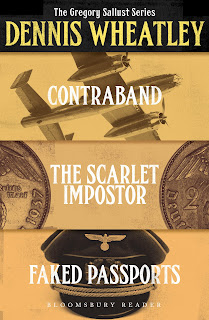Dennis Wheatley's 1940 novel The Scarlet Impostor is set in the World War II.
I have read dozens of novels in the subgenre of spy-versus-spy behind-the-lines in Hitler's Europe. The Scarlet Impostor is superior to my previous favorites, novels like The Eagle Has Landed, Cold Harbor, and Night of the Fox by Jack Higgins.
Wheatley fills his novel with ten times the action, variation, and complication as Higgins.
Gregory Sallust is sent to Germany just after war is declared in 1939. His mentor Sir Pellinore Gwain-Cust wants him to make common cause with anti-Hitler elements in the German ruling class and provide them with a list of Gestapo agents bent in thwarting their conspiracy.
Sallust disguises himself as a Wehrmacht general and blows his own cover within 48 hours through his own impatience and arrogance. Two leaders of the anti-Hitler conspiracy are killed because of his actions. Sallust then spends weeks on the run in fine Buchan/Household style, followed by interment, before returning to the UK.
Once back home, Sallust must try to pull together a few remaining leads, then make another infiltration of Germany. In this he is aided by the an almost infuriating use (or better yet, abuse) of coincidence by Wheatley.
Preoccupations with torture and blinding recur at different turning points in The Scarlet Impostor. SS leader Grauber blinds an English communist leader while torturing him to find out about the communist underground in Germany. Later, in a fight with Sallust, Grauber is himself blinded in one eye.
The Scarlet Impostor is well worth reading, a rich and very satisfying hunter-hunted thriller.
Jay
4/1/17

No comments:
Post a Comment